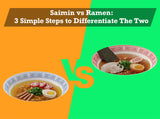
Do you think it’s possible that ramen will be as big as sushi?
Yes, ramen will be as big as sushi.
It might even be bigger than sushi, actually.

Here are some reasons why I think ramen will be bigger than sushi:
Reason 1: The number of restaurants in Japan
In Japan, there are 24,000 sushi restaurants. It is quite a lot, right?
However, there are 30,600 ramen restaurants in Japan.
The number of ramen restaurants is larger than sushi restaurants in Japan.

Did you know?
In the United States, sushi became popular in the late 70s and early 80s through movies by the trend-setting film industry people.
In the US, sushi was infused with North-American elements in order to adapt to North American palates. (California roll, anyone?)
Do you think the same thing will happen to ramen?
I think it will.

Some people have problem with sushi.
The thought of raw fish can be frightening to some.
However, most people don't have any problem with noodles.
Ramen is made of almost the same ingredients as pasta.
That is why I think ramen will be more popular than sushi.
In North America, ramen has been as popular as instant noodles since Nissin Foods launched their product in 1971.
It has been especially popular among college students.

Finally, ramen shops gained notoriety and popularity in the early 2010's.
It is quite recent. Right? But..
Look:
Pho has been pretty popular in the US, but ramen is about to catch up.
How do I know? Internet search volume for ramen shops.
Reason 2: Ramen is addictive
Ramen has the perfect balance of amino acids, fats, and carbohydrates.

Do you know where these things come from in a bowl of ramen?
Amino acids come from the umami of the soup.
Fat in ramen comes from pork, chicken, seafood and flavored oil.
Fact:
When you eat fatty foods, your brain releases pleasure chemicals, such as dopamine and β-endorphin.
What about carbohydrates from noodles?
Carbohydrates turn into energy for your body.
It also raises your blood sugar level.
And when it happens, your brain releases pleasure chemicals too.
For example,
Dopamine makes you feel good and serotonin makes you happy.
So fat and carbohydrate are important elements of deliciousness.
Ramen is a miracle food that has the perfect balance of amino acids, fat, and carbohydrate.

They harmonize together in a bowl of ramen.
Because of this harmony, it is delicious and quite addicting.
Reason 3: Ramen is inexpensive
You cannot get the same satisfaction with a different type of food for this price.

Yes, it’s true that $10 ramen is ridiculously expensive compared to $0.3 instant noodles.
However, a bowl of ramen at ramen shop is still cheaper than your average lunch at a restaurant.
You can order kaedama (noodle refill) if you are not full...
... for only a buck.
Reason 4: Ramen shops are profitable
If you think about the business side of ramen shops, the cost of ingredients is like this...
Cost of Ramen:
Shoyu Ramen: $1.90 (Noodles: $0.6, Soup: $0.6, Toppings: $0.7)
Shio Ramen: $1.90 (Noodles: $0.6, Soup: $0.60, Toppings: $0.7)
Tonkotsu Ramen: $2.20 (Noodles: $0.5, Soup: $1.10, Toppings: $0.6)
Miso Ramen: $2.00 (Noodles: $0.6, Soup: $0.6, Toppings: $0.8)
Let's say you own a ramen shop, and you sell shoyu ramen for $10.

You will need to pay to your waiter/waitress approximately $2.5 for each bowl of ramen served.
(I calculated this number loosely based on the idea that 25% of sales goes to labor costs)
And $1 for rent. (Because it is said that 10% of sales go towards rent)
$1 for Gas, water, and electricity. (Based on the assumption that 10% of sales go towards gas, water and electricity)
That means...
$10 - $1.9 (ingredients) - $2.5(labor costs) - $1(rent) - $1(Gas water, and electricity) = $3.6
36% of profit margin is pretty good, right?
Based on these reasons, there is a high chance of a ramen boom in the world. Do you agree with me?
Please let me know in the comments below!



Leave a comment